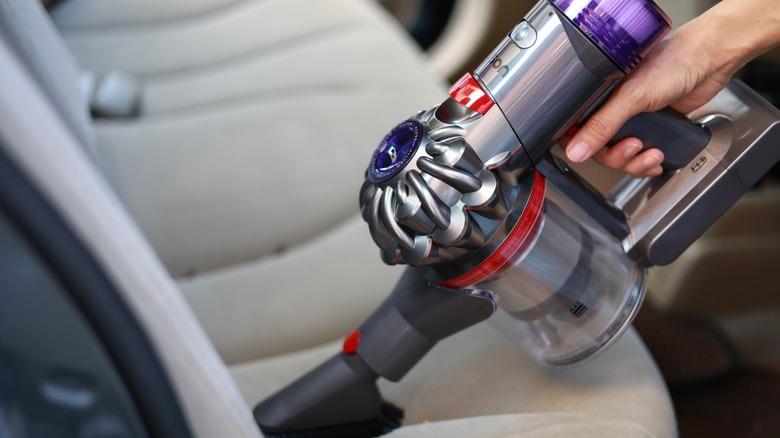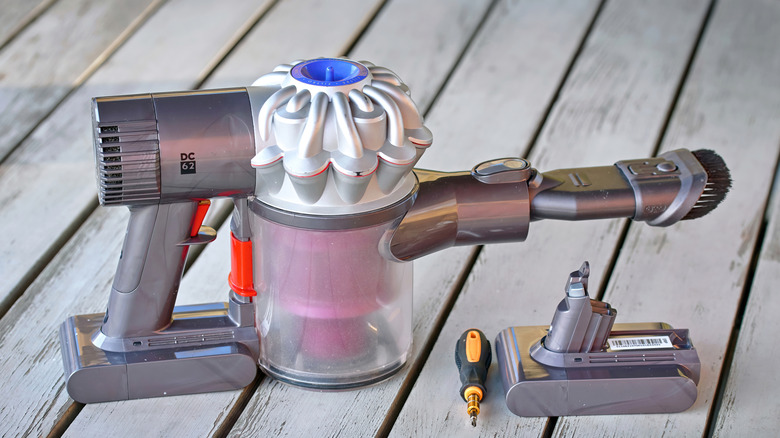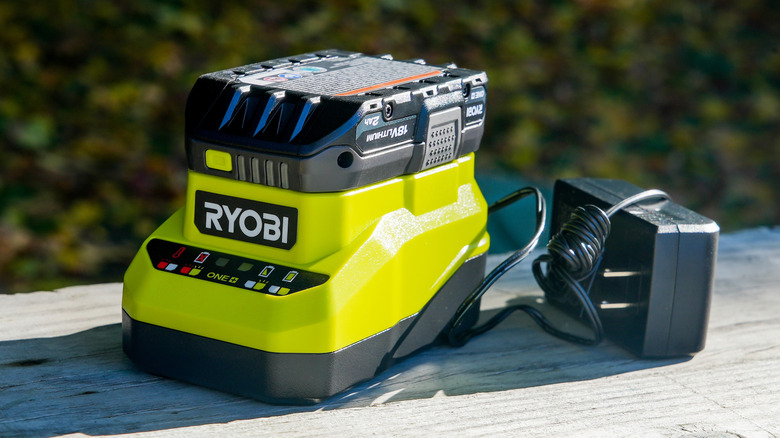Are Ryobi Batteries Compatible With Dyson Vacuum Cleaners? Here's What We Found
Dyson's arguably the most popular vacuum brand on the market. But if you own one of their cordless vacuums, at some point the battery won't be able to hold a charge anymore. That's really the way it is with most battery-powered devices. And it stems from the fact that lithium-ion batteries, no matter the brand, degrade over time with each charge cycle. However, when it's time to replace the battery, you're suddenly faced with one of the major downsides of owning a Dyson vacuum.
Many owners complain about their experience with customer service. But that's not the worst part. Their policy pretty much requires you to buy your replacement battery directly from them, and that could cost up to $150, depending on your model. Surely, there must be a cheaper way to get your Dyson vacuum running again. Doesn't Ryobi also make rechargeable battery packs for their power tools and stick vacuums? In that case, couldn't you just use a Ryobi battery in your Dyson vacuum and save yourself some money?
Yes, Ryobi does make rechargeable battery packs, but unfortunately, they are not quite compatible with Dyson vacuums. The connection systems are completely different, which means there's no direct way to make them work together. And while third-party adapters do exist that claim to bridge the gap, they come with serious risks that could end up costing you even more than just buying the Dyson replacement.
Why Ryobi batteries won't work for your Dyson vacuum
There are a few non-Ryobi tools you can use with your Ryobi batteries but the Dyson vacuum isn't one of them. And it all comes down to the proprietary design. Every major brand, whether it's Ryobi, Dyson, DeWalt, or Kobalt, uses its own unique battery management system. This is not simply about keeping you locked into their ecosystem (although that's definitely part of it). Each brand designs its batteries around the specific power requirements of its products, which means the connection points, voltage regulation, and even the physical shape are all customized.
If you put a Ryobi ONE+ 18V battery next to a Dyson V8 battery, you'll notice they're quite different. The Ryobi battery has a thick, sturdy stalk with terminals on the sides that plug straight into Ryobi tools. The Dyson battery also has a stalk, but it's thinner and slightly curved because it's designed to slide directly into the vacuum's handle and interact with the trigger mechanism that controls power flow.
This means a Ryobi battery physically cannot fit into a Dyson vacuum's battery slot. The stalk is the wrong shape and size. Even if you could somehow force it to fit (which you can't), the power terminals wouldn't line up with Dyson's internal connectors, so no power would flow anyway. And because Dyson batteries are specifically designed to work with the vacuum's trigger system, jamming a differently-shaped battery in there could prevent you from even pulling the trigger to turn the vacuum on.
Third-party adapters may seem like a solution, but here's why they're not
A quick search on Amazon or eBay will show you plenty of third-party battery adapters claiming to connect Ryobi batteries to Dyson vacuums. These adapters work by attaching to your Ryobi battery and providing a Dyson-shaped connector on the other end. On paper, it sounds like the perfect solution. But in reality, they're not. First, these adapters aren't universal. You need one that's specifically designed for your exact Dyson model. A Ryobi-to-V8 adapter won't work on a V11, for instance.
But the bigger problem is what happens when you bypass the smart tech built into the battery system. Ryobi batteries have internal circuits that regulate power output and prevent overheating based on what tool they're connected to. When you use an adapter, you bypass those safeguards, and power flows through unregulated. That could mean your vacuum runs weak and struggles to pick up dirt, or it could mean too much power surges through and fries the motor completely.
And if anything goes wrong while using one of these adapters, you're on your own. Both Ryobi and Dyson consider your warranty void the moment you use an unauthorized accessory. So you could end up replacing two batteries (the Ryobi and the Dyson) and a fried vacuum. Ultimately, it's safer to go with the official Dyson replacement, or if your vacuum is older and the battery costs nearly as much as a new vacuum, it might be time to consider upgrading to a newer model.


